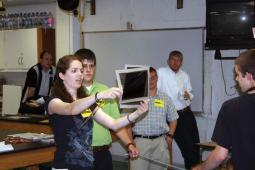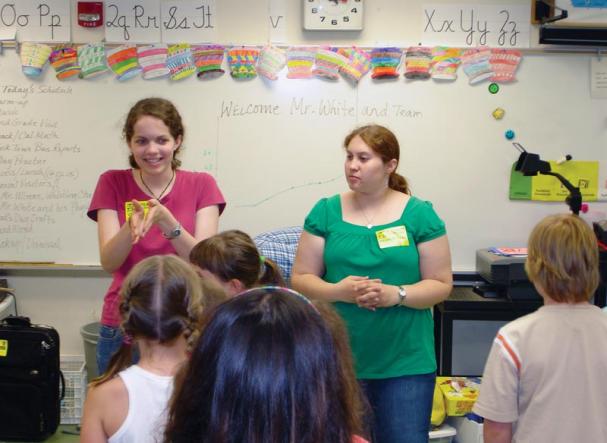Six Reasons I Do Outreach
Spring
2014
Special Feature
Six Reasons I Do Outreach
Jenna Smith, Graduate Student, Michigan State University, East Lansing
01
It reinforces my own physics knowledge. Teaching science to a wide variety of audiences requires a deep understanding. I can’t rely on saying, “Well, the math comes out that way.” I need to have a physical understanding and communicate that to them. I also have to pick up all the details that I’d previously brushed over. This reinforcement makes me a better scientist.
02
It reminds me that i love my field. On one hand, I get to interact with some people who really are enthusiastic about science, and that rubs off on me and renews my enthusiasm. On the other hand, I can’t be effective at outreach without enthusiasm, so when I’m down on my research, outreach can force me into a “fake it ‘till you make it” situation and bring out my original enthusiasm. Recapturing that enthusiasm can be crucial for getting me through tough days at work.
03
 It brings me back to the "Big Picture" motivation for my work. Sometimes I get too caught up in the details of the work and forget the bigger motivation: we don’t have a good model for how protons and neutrons interact, and we still can’t tell you how all the elements were made. Outreach about my research in neutron-rich nuclei requires me to provide context and motivation for my audience. There’s the “motivation” section for my next research presentation or proposal.
It brings me back to the "Big Picture" motivation for my work. Sometimes I get too caught up in the details of the work and forget the bigger motivation: we don’t have a good model for how protons and neutrons interact, and we still can’t tell you how all the elements were made. Outreach about my research in neutron-rich nuclei requires me to provide context and motivation for my audience. There’s the “motivation” section for my next research presentation or proposal.
04
I'm a better communicator because of the outreach. The participants are different for each outreach event, which forces me to practice identifying how sophisticated their science knowledge is, reading their signals, and tailoring my message to different audiences. All of these skills are useful in giving research presentations as well.
05
I'm breaking down stereotypes. Stereotypes: scientists are smart people, but with minimal social and communication skills. All scientists are old, boring, white men. I can’t defy the “white” stereotype, and I wouldn’t dare refute the “smart” label, but my presence at outreach events shatters the rest of these stereotypes and hopefully enables others to see themselves as scientists..
06
I'm a role model for future scientists. If every scientist could inspire two children to value science and be curious about it, we could change the world. //
Jenna Smith went to Rhodes College in Memphis, Tennessee, for her undergraduate degree in physics (see p. 20 for the zone meeting recently hosted by Rhodes) and recently received her PhD in nuclear physics. She is a former SPS intern and former student representative on the Executive Committee of the SPS National Council.
The Outreach Lifestyle
My outreach experience stretches back to a high school open house I spent on roller blades, demonstrating conservation of linear momentum. It continued through pumpkin drops and Oobleck sidewalks in college, and included a stint as an SPS summer intern, during which I developed a Science Outreach Catalyst Kit (SOCK) to assist other SPS chapters in setting up their outreach programs. I’ve taken advantage of outreach opportunities in graduate school ranging from interactive classroom lessons about nuclear science to demonstrations at a national science fair. Who knows where my outreach career will go next?

